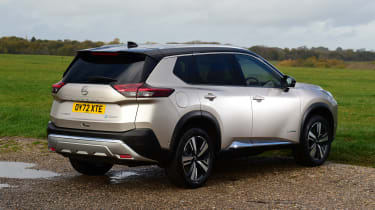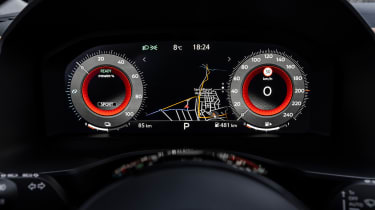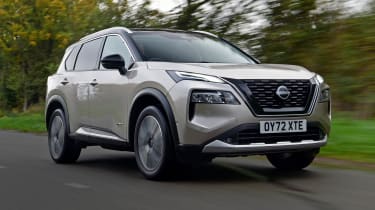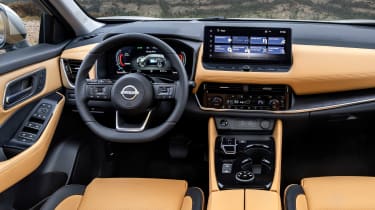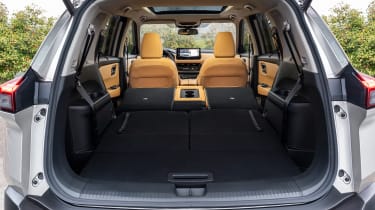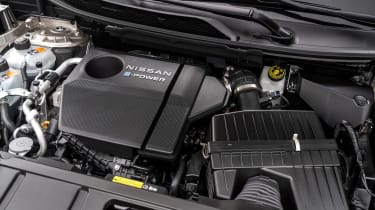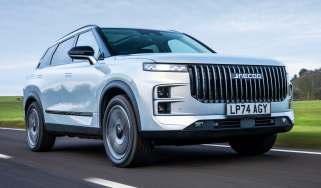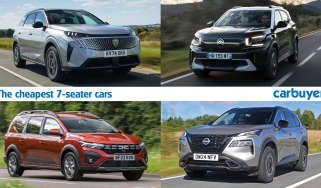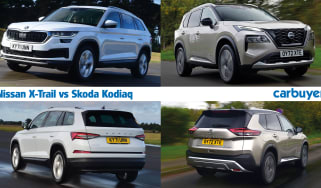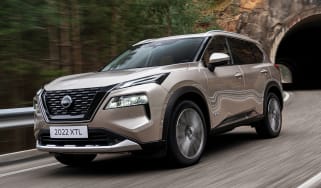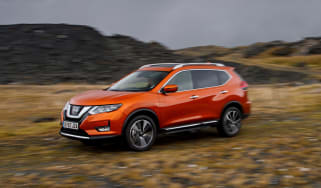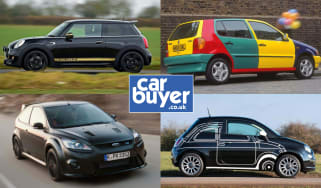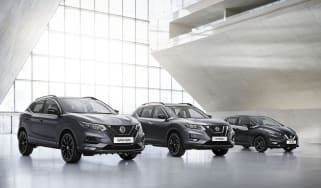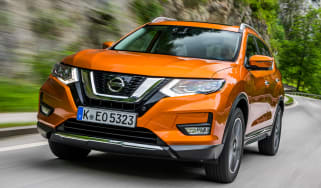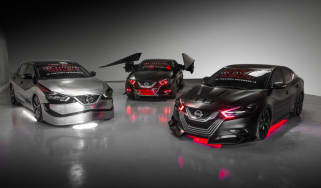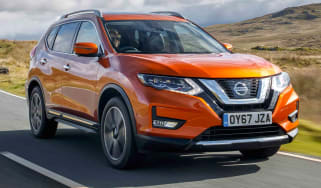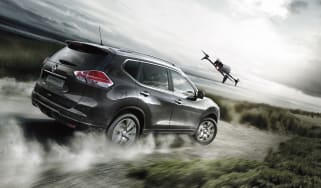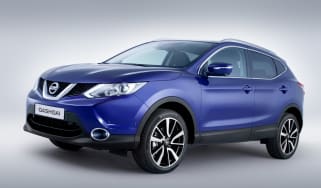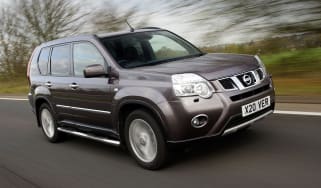Nissan X-Trail review – a seven-seat SUV with hybrid power
“The X-Trail is a practical seven-seat SUV, but don’t be fooled by Nissan’s e-Power hybrid tech; it’s not hugely economical”
Pros
- Optional all-wheel-drive
- Giant head-up display
- Practical
Cons
- Not the most economical
- Base models lack equipment
- Some cheap trim
Verdict – is the Nissan X-Trail a good car?
The Nissan X-Trail is a large and practical seven-seat SUV that's a rival to models including the Skoda Kodiaq, Kia Sorento and Hyundai Santa Fe. It's fitted with an innovative hybrid powertrain that makes it feel rather like an EV, because the wheels are powered by electric motors instead of its petrol engine. However, the X-Trail's size and weight mean this isn't a magic bullet for running costs; we found its fuel economy average at best, while it's also not especially company-car driver friendly. Don’t expect driving thrills either – this is an SUV that puts comfort first.
Nissan X-Trail models, specs and alternatives
For years, the Nissan X-Trail has been the largest model in the Japanese brand’s lineup. The latest generation debuted in 2022 and can be configured with either five or seat seats, making it a key competitor for the likes of the Skoda Kodiaq, Kia Sorento and Peugeot 5008.
Visually, the new X-Trail is a grand departure from the old car which was beginning to look a bit dated when it was discontinued in 2021. The third-generation model gets a design first debuted by the much smaller Nissan Juke, with a curvy shape and a sleek running light design, along with a slightly more rugged look if you opt for the outdoorsy N-Trek trim.
 The 10 best large SUVs on sale in 2025
The 10 best large SUVs on sale in 2025
On the inside, the X-Trail gets Nissan’s latest infotainment setup, which looks pretty good, but isn’t as responsive as the systems you’ll find in some rivals. The overall design of the cabin feels much more chunky and substantial than style-focused rivals, a nod to the fact the X-Trail is one of the handful of cars in the class available with all-wheel-drive – a feature you’ll want if you plan on towing, as we’ll explain later.
More reviews
The most notable feature of the new Nissan X-Trail is its unique e-Power hybrid powertrain which uses the petrol engine to provide energy for the electric motor, rather than to power the wheels – we’ll also go into greater detail about this later on in the review. There’s a more traditional petrol mild-hybrid too, which is the cheapest way into the X-Trail lineup, so this option should be well-suited to buyers with a lower annual mileage. Starting from just over £35,000, it’s around £2,500 less expensive than the equivalent e-Power hybrid.
Speaking of which, there are quite a few options to choose from in the Nissan X-Trail range; on top of the two powertrains, buyers must pick from one of five different trim levels: Acenta Premium, N-Connecta, N-Trek, Tekna and Tekna+. Standard equipment is generally strong, and the entry-level Visia has been discontinued – no great loss as it missed out on crucial kit such as an infotainment system and a reversing camera. All trims attain a five-star Euro NCAP safety.
MPG, running costs & CO2
The Nissan X-Trail is now available as a hybrid model, using similar technology to that found in the Nissan Qashqai e-Power. Unlike a more traditional hybrid setup like you’d find in a Toyota Prius, the X-Trail is only ever powered by its electric motors. Its 1.5-litre petrol engine acts as a generator, ensuring there’s always enough energy in the 2.1kWh battery to supply its motors and propel the car forwards. The official results of all this tech are official figures of up to 49.6mpg with 129g/km of CO2 emissions – slightly down on the Qashqai e-Power, which is unsurprising given the X-Trail’s larger size. It’s also a figure that drops to around 44mpg if you pick the model with four-wheel drive and seven seats fitted.
When we tested the X-Trail against a Kia Sorento Hybrid, the Nissan did manage to beat it, averaging 42.5mpg compared with just 39.5mpg for the Sorento.
Nissan’s ‘e-Pedal Step’ is also inherited from its EVs, which provides a braking effect when you ease off the accelerator pedal, putting energy into the battery to help improve efficiency. It’s impressive technology, but it does seem rather disappointing that such a lot of hardware can’t cajole the X-Trail e-Power beyond 50mpg.
The rear motor has allowed Nissan to pull off some neat tricks, however. With a response 10,000 times faster than a traditional all-wheel drive system, Nissan claims it provides the driver with more control in slippery conditions. For such a large car, body roll is kept to a minimum on a twisty road, but unfortunately, there isn’t a huge amount of feedback from the steering. You get the impression that Nissan’s engineers prioritised comfort over handling, which isn’t really a negative for a tall SUV.
Engines, drive & performance
If you decide on the hybrid powertrain, there’s still the option of front-wheel drive or Nissan’s e-4ORCE all-wheel drive system. The latter adds a second electric motor to the rear axle, increasing power from 201bhp in the standard version to 210bhp. Depending on the version, the benchmark 0-62mph sprint takes between seven and eight seconds. That’s pretty quick for a big family SUV, but the X-Trail never feels quite this nippy in normal driving, instead serving up smooth acceleration that’s very similar to that of an EV.
The rear motor has allowed Nissan to pull off some neat tricks, however. With a response 10,000 times faster than a traditional all-wheel drive system, Nissan claims it provides the driver with more control in slippery conditions. For such a large car, body roll is kept to a minimum on a twisty road, but unfortunately, there isn’t a huge amount of feedback from the steering. You get the impression that Nissan’s engineers prioritised comfort over handling, which isn’t really a negative for a tall SUV.
The mild-hybrid model is the least powerful of the range and is only available in front-wheel drive configuration. This utilises another 1.5-litre three-cylinder petrol engine, but this time with a smaller 12-volt mild-hybrid electrical system to produce 161bhp. The whole setup is mated to a CVT automatic gearbox, with 0-62mph taking a rather disappointing 9.6 seconds. Because of this, we believe the mild-hybrid is best-suited to driving around town as it’s likely to struggle with overtaking on the motorway.
Interior & comfort
It quickly becomes clear as soon as you step behind the wheel of the new X-Trail that this is a car that’s been designed to travel at a relaxed pace. While the hybrid and mild-hybrid powertrains can be a bit thrashy when pushed hard, when cruising they blend into the background nicely. It’s a shame the electric motors produce an audible whine, though, which we found quite a bit louder than in the hybrid Kia Sorento. Otherwise, there’s little wind or road noise, making the X-Trail a good choice for long trips.
The Japanese brand has also used several tricks to make the X-Trail more comfortable. A large amount of suspension travel on the springs means the car manages larger bumps and potholes well, while engineers have utilised the car’s regenerative braking feature to improve refinement even further.
Stepping inside, the new X-Trail marks a big improvement over the old car; the expansive 12.3-inch touchscreen is much more attractive and bolstered by a configurable 12.3-inch digital instrument cluster. It’s a shame, then, that we found the infotainment rather laggy, with operations like entering an address being rather long-winded. It’s a similar story if you need to disable some of the driver aids, requiring several presses of the steering wheel controls.
Material quality has improved overall, too; nearly everything you touch feels solid. There are a couple of trim pieces that let the X-Trail down though, with the rather naff-looking fake wood on the dashboard making an otherwise pleasant interior feel a bit low-rent.
Acenta Premium gets an eight-inch display, rear-view camera, front parking sensors and Apple CarPlay/Android Auto along with dual-zone climate control, but it’s N-Connecta we expect to dominate sales. That’s because it’s the first trim level with dual 12.3-inch displays, making the most of Nissan’s updated interior design and infotainment technology. It also brings wireless smartphone connectivity and features like Nissan’s Around View Monitor, along with ambient lighting and even roof rails.
Slotted into the range in spring 2024, N-Trek gave the X-Trail an outdoorsy makeover, with tough-looking new bumpers and gunmetal exterior trim. The interior also got rubber floor mats and a reversible boot liner to make it easier to clean out after adventures in the countryside. However, it’s worth noting that the boot liner can’t really be stowed with all seven seats in place, so probably needs to be left at home – something to consider if you often carry lots of passengers.
Tekna adds items like a glass roof, powered tailgate and head-up display, while the flagship Tekna+ is even more luxurious thanks to quilted leather seats and a Bose 10-speaker stereo.
Practicality & boot space
As standard, the Nissan X-Trail comes with five seats, however, for an extra £1,000 Nissan will fit a third row in the rear. While these two extra seats are really only meant for children (or shorter individuals measuring under 1.6m) they are a great addition and should be useful when you need to carry extra passengers in a pinch. Passengers will need to be fairly agile to clamber in the back row, however, and how much space they’ll have depends on how far the middle row is slid forwards.
When it comes to interior storage, there are both pros and cons. The good bits include practical luggage hooks, cabin lighting and a mobile charger that can hold the latest crop of large smartphones. The door bins are a good size, but there’s no soft lining to stop items rattling, the glovebox is a bit small and the rear seats split and fold in a 60:40 arrangement, rather than the more flexible 40:20:40 of some rivals.
With the third row of seats folded up, the X-Trail’s boot is about the same size as a city car, appropriate for only a few bags of shopping. Fold the rearmost row down and you’ll increase this to 485 litres of space – five-seater cars have slightly more space at 585 litres. With both sets of rear seats down a cavernous 1,424 litres of cargo volume is opened up, making the X-Trail a great load-lugger for larger items. This is by no means class-leading, however, with the Skoda Kodiaq serving up 910 litres with five seats and a huge 2,015 litres with the rear seats folded down.
Is the Nissan X-Trail a good tow car?
You won’t just want to choose any old X-Trail if you plan on towing, because specification really counts here. The one to avoid is the e-Power with just front-wheel drive, because this limits its towing capacity to just 670kg – less than many superminis can manage. Pick the e-Power with all-wheel drive and this figure shoots up to 1,650kg for the seven-seater and 1,800kg for the five-seater – a much more impressive figure. The latter is matched by the seven-seat mild-hybrid, while the cheaper engine with just five seats tops the billing with a 2,000kg towing capacity.
Reliability & safety
Japanese cars are renowned for their reliability, but Nissan only had a middling result in our 2024 Driver Power customer satisfaction survey – the brand came 15th out of 32 manufacturers – an improvement from its 19th spot the year before. A reasonable 18% of owners reported a fault with their car within the first year of ownership, which is a lower proportion than quite a few rivals.
While the X-Trail didn’t feature in our latest model-specific rankings, Nissan Qashqai owners placed it 42nd out of the 50 top models. They were impressed with its refinement, but marked it down for infotainment and build quality.
The Nissan X-Trail scored the full five stars when it was tested by Euro NCAP in 2021. Family buyers will be particularly impressed to see that both adult and child occupant safety in the X-Trail scored 90% or above. It was also a particularly strong performer in the Safety Assist category with a 95% overall score. As standard, all cars come with a wide raft of safety kit which includes autonomous emergency braking, automatic high beams, blind spot monitoring, lane-keep assist and rear parking sensors.

